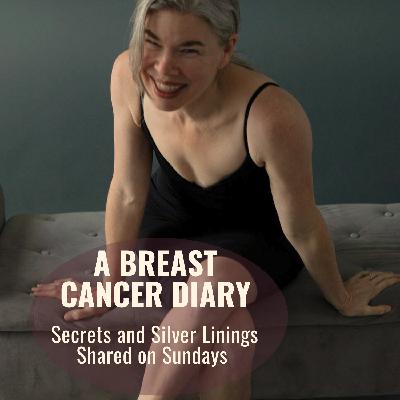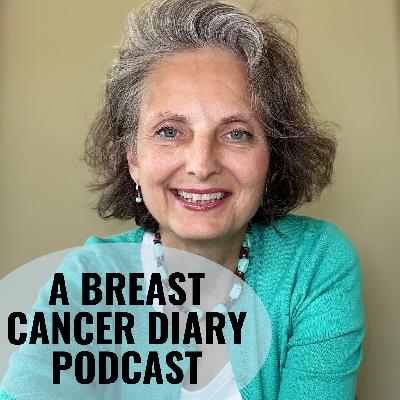26 Year Metastatic Thriver, Heather Jose
Description
My guest Heather has been thriving with metastatic breast cancer for nearly 27 years! How did she do it? She feels that it's a combination of things--not necessarily the trial on stem cell therapy combined with high-dose chemo. She feels that her long-term drug, Faslodex, as well as lifestyle choices around nutrition, exercise and mindset are key in her success.
Heather's web site is: https://heatherjose.com/
and her podcast is on YouTube at: https://www.youtube.com/@ImStillHereCancer/videos
Kathleen does zoom based peer navigation/mentoring sessions now. Schedule a session here for a sliding scale of $35 to $95 per hour long session: https://kathleenmoss.simplybook.me/
Transcript:
Today's podcast guest is Heather Jose. She's from Mount Pleasant, Michigan, and she's an occupational therapist, and the most remarkable thing to know about her is that she's a 26 year post metastatic breast cancer survivor and thriver. And that's a main reason why I have her on the podcast today.
I've never met anyone that has lived that long and thrived that long after a metastatic diagnosis. I'm so excited to have you, Heather.
H:
Thank you. It's great to be here.
K:
Thanks for coming on. So a huge part of your story is, well, you're, you're a podcaster too, and you tell your story in an informal YouTube and podcast setting. Uh, there in your home with your husband usually, and sometimes your kids are, are joining to tell their part of your story. Um, so people can learn about your entire journey just by looking at back episodes of your podcast.
But. I wanna hear what you feel you did differently than maybe some of the people you meet who have had metastatic breast cancer and how your path was maybe a little bit different than the conventional path after being diagnosed. Oh. Start out by telling us if you had an early diagnosis before your metastatic diagnosis.
H:
No, I was diagnosed de novo, so stage four from the start. Um. I think, and I, looking back, I was 26 when it happened, and I think some of what worked for me was being a little bit naive about a lot of things, right? I look at, my daughter is now 27 and doing great at life, but you know, there's a lot that you learn over the course of time, right?
So I think it helped me to be able to just kind of go into this going, well, okay, how do I, how do I stay here? How do I figure this out without knowing, I don't know, even the gravity of all of it.
K:
Sure. Absolutely. And did you, how many months or years did you stay with just conventional treatment before branching out into integrative treatment?
H:
Well, the, my first doctor told me to get my affairs in order, I stayed with him for about 20 minutes and we were done forever. The, the next oncologist that I talked to was the next day. She told me even on that phone call, "drink some green tea, eat some fruits and vegetables and we'll start killing cancer on Monday." And it was so empowering, like, SO empowering. Here's a oncologist from the University of Michigan who you know, is renowned in her field and, and, she's telling me like, go get some green tea and it was the best thing ever for me. And that of course kind of was like, okay, what can I do? so right from there we started to do some research.
And when I say we, I should say my mom, because I knew early on that I could not handle all the information coming in. I knew that it, I just needed to kind of protect my mind and kinda keep myself in a bubble. So she started doing, some exploration of, you know, what else is available that could help kind of bring pieces, of knowledge to the table. Because even at that time, and I, I know nutrition's tricky anyway, and I know you've talked about some of this, right? But you'll, somebody will tell you "a calorie is a calorie" and somebody else will say, "no, you have to do this." And we wanted somebody who was like, no, what we would like you to do is this, and the reason why is because the research has shown the way to go. So we actually found, um, an integrative oncologist early on. I, I was seeing him, I was diagnosed in December and I went to see him in February.
K:
And this is Dr. Block.
H:
This is Dr. Keith Block. So, yeah, and he's, um, he's in Skokie, Illinois now. He was in Evanston at the time, but they're just neighboring towns. And, um, it was so, it felt so good to me to be there, to have them kind of say, yeah, we'll, we'll help you kind of put together a plan, but also the reason why we're doing this is we're gonna look at these labs, or we know what this study says. All of that kind of information was great. I felt like I could just, you know, really rely on them.
K:
So when you went to see Dr. Block, did you leave the green tea oncologist behind or did you continue to work with her?
H:
No. She's still my oncologist. I mean, and, and I went to Dr. Block saying, Hey, I've got this great oncologist and what do you think of this plan? And he said, I think that's a great plan. And here's what, you know, we can add to it. So it was kind of nice to have kind of a second opinion all the way through, um, the first, the early years, and then also have this nutritionist and, and different people on board.
K:
Okay, so Dr. Block worked in collaboration with your oncologist. Would you say that?
H:
I would say Dr. Block, um, helped me put together the other pieces of the puzzle that I was really interested in, in terms of nutrition, supplements, he was talking about visualization, encouraging exercise, which my regular oncologist was also doing. It felt really good to have this kind of, not that they were talking a whole lot, but to have both of these people that I really trusted telling me, yeah. "Do these things."
K:
And they actually agreed about what these "these things" were? Wow. That's great.
H:
Yeah. My oncologist has always been, um, I think ahead of her time you know, in terms of recognizing what our bodies can do with proper nutrition, exercise, all of those kind of things.
K:
Okay. I was gonna ask you if you ever went back to her now, you know, 20 some years later and said, why the heck did you tell me to go and eat green tea? But it sounds like she has continued to be consistent in her endorsement of things like green tea and fruits and vegetables.
H:
Absolutely, it's been a while, but we ran a 10 K together once. She's very supportive of being active and healthy and she will always. Um, check in on all of those kind of things. What am I doing to work out? How am I eating all of that?
K:
Okay. Now the $10 million question, do you feel like your lifestyle choices in terms of working out and eating right, have made, and does your intuition tell you that those things have made a difference in your longevity?
H:
I think absolutely. I think part of it is that you're trying to build what. least at the beginning, I was trying to build the healthiest body possible so the treatments could be as effective as possible,
I wanted to kind of eliminate any of the extra work that my body was maybe having to do, you know, and, and give it really great fuel. That was my whole, know, process in that was how can I make my body as efficient and effective as possible?
K:
Okay, so you're saying you wanted your body to be in good shape so that the treatments could be effective, so you weren't replacing the treatments with lifestyle. I think that's a really important distinction.
H:
God, no. Absolutely not. Not at all. And there's this other big piece, which is mindset. So for me, I was kind of like, I need to believe in everything that I'm doing, and being able to believe in these things then helps me kind of put together this whole picture. The medicine's working and it's doing its job, and I am doing my job by, you know, keeping myself as healthy as I can be.
I mean, it's, it's a whole picture.
K:
Yeah, so Dr. Block is a, a medical doctor and he's an integrative. He has an integrative center, I think. So let me just clear clarify for the listeners who don't understand the difference between integrative and alternative, I. Because there's this really crazy amazing, um, series on Netflix right now that just came out called Apple Cider Vinegar.
That is, I think, not defining these things very well. And it really strikes terror into some patients when they don't have definitions. So alternative therapy, uh, natural therapies can be offered instead of conventional medical treatment. And that's, that's what we call alternative, but integrative means it's a natural approach or a lifestyle approach that works hand in hand with conventional medical therapies, and that's what, obviously that's what you've chosen and what Dr. Block has chosen. He's not saying "you don't need chemo radiation, you don't need those oncology drugs or the hormone, suppressors."
He's saying, do all of that and let's do what we can to get your body into the best shape it's ever been in so that your body is resilient. Against the negative effects of those treatment, but also receptive to the positive effects of those treatments. Okay.
H:
Perfectly said.
K:
Okay, cool. 'cause I want Dr. Block to not fall into that camp that is being, you know, criminalized--rightfully so. I think! ...by, by this, this new wave of, of truth telling in cancer where, you know, the, the Hirsch therapies in the movie, apple cider vinegar down in Mexico is, is really the Gersen plan or the Gersen therapy. And that really is an alternative. They use enemas and juicing instead of chemo and radiation
Typically, I don't know what they're doing now, but typica







